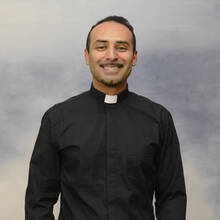A pressing question for today: Who am I?
The Gospel of Luke provides some of the more memorable stories that linger in our moral imagination. This remains true for this Sunday’s readings where, unique to Luke’s Gospel account, Jesus recounts the story of the Good Samaritan. The message of the passage is tied to this Sunday’s first reading, which highlights the biblical mandate to love God with all of one’s heart and soul. The readings this Sunday demonstrate that love of God goes hand in hand with care for one’s neighbor.
“What is written in the law? How do you read it?” (Lk 10:26)
What prejudices do you harbor that might prevent spiritual growth?
Who is the neighbor in need that comes to mind in prayer?
Who is the actual person in your path that calls forth mercy from you?
The scholar of the law asked a question, “And who is my neighbor?” (Lk 10:29). This inquiry merited attention and called on Jesus to reflect on response, a reflection that we still need to carry on today. The story Jesus offered in reply to the scholar’s question is well-known to many inside and outside of Christian circles. The Samaritan traveler is the only one who stops to care for the man found half-dead on the side of the road. The priest and the Levite, both religious officials connected to the temple, do not stop to help the victim.
There are clear implications to this Gospel narrative. Jesus broke through limitations on love imposed by ethnicity, blood and creed. Samaritans and Jews had a long history of antagonism. In fact, not long before Jesus offered this parable, the road through a Samaritan town was closed to him when the townspeople learned his destination was Jerusalem. (Lk 9:51-56). In spite of that fresh hostility, Jesus could imagine a compassionate Samaritan in this Sunday’s Gospel passage.
Likewise, Jesus obviously challenges the religious priorities of people who worked in the temple. Contact with human blood rendered one unfit for liturgical service. The officials who hurry past the stricken man do so so that they could remain able to do their job. Jesus in fact does not change the purity laws that would have rendered them unclean, but he does challenge the priorities that guided the following of those laws. In Jesus’ mind, compassion to a suffering Israelite is more important even than service in the temple.
Jesus also highlights the sacrifice made by the Samaritan. The traveler offered his time, attended to the victim’s wounds and offered two denarii, two silver coins and even more if needed. “Take care of him. If you spend more than what I have given you, I shall repay you on my way back” (Lk 10:35). Two silver coins at that time would have been the equivalent of two- or three-days’ wage, potentially hundreds of dollars today.
Jesus tries to help the young scholar of the law re-order his priorities regarding purity, holiness and ethnicity. God instructed Israel to attend to these things in order to prepare their hearts for wider service to God and compassion for neighbor in everyday life. Learning how to love one’s neighbor in Israel prepared one to have compassion on one’s neighbor in the wider world, where antagonisms could obscure God’s intent. Similarly, learning how to serve God in the temple, where it was relatively easy, prepared one to serve God in the wider world, where the divine presence was often difficult to find.
The material in Luke’s Gospel right before this Sunday’s passage gives context to this insight. “For although you have hidden these things from the wise and the learned,” says Jesus,” “you have revealed them to the childlike” (Lk 10:21). Jesus recognized that this scholar of the law was open to change. Metanoia, meaning change and repentance, is central to Luke’s Gospel. Luke shows us a scholar of the law undergoing this exact process. Without losing an authentic appreciation of his nation’s ancient traditions, Jesus helps him re-order his priorities to match God’s hope for Israel and, through them, for all of humanity. Through this Gospel passage, Jesus calls on his disciples to be so transformed today. At our Lord’s call, we need to leave behind assumptions about ethnic, political and social boundaries and learn to be sensitive to God’s call to compassion wherever we hear it.








